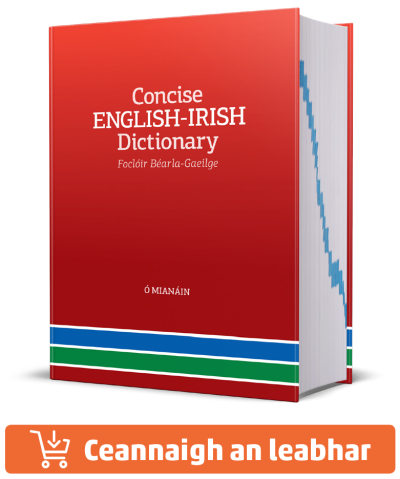Foclóir Gaeilge–Béarla
Ó Dónaill, 1977
An Foclóir Beag
Ó Dónaill & Ua Maoileoin, 1991
English–Irish Dictionary
de Bhaldraithe, 1959
Gramadach
Foghraíocht
desna
det
déthaobhach
déthaobhachas
déthéarmach
déthoiseach
déthreo
dhá
dhaichead
dhaoib(h)
dháréag
dháríre
dhe
dhé
dheamhan
dhein
dhera
dhi
dhíb(h)
dhínn
dho
dhó
di
Seans gur foirm é dhá de:
dá »
dhá1, num. a. (Form dá used after article, aon and céad2; followed by sg. of noun and pl. of a.; lenites noun, except when preceded by 3 sg. f., or 3 pl. possessive adj.) Two. 1. ~, an dá, chrann mhóra, two, the two, big trees. Luach ~, an dá, phunt, two, the two, pounds’ worth. A ~ chapall, capall, gcapall, his, her, their, two horses. Tá do ~ airde ann, he is twice as tall as you. Tá a ~ oiread agam leo, I have twice as much as they have. In ~ áit, in two places. ~, an dá, bhliain déag, twelve, the twelve, years. ~, an dá, chontae dhéag is fiche, thirty-two, the thirty-two, counties. ~ fhichid, fhichead = daichead. 2. (Used of persons) ~ mhúinteoir, two teachers. Tá an dá Bhrian ann, there are two sides to Brian’s character.
dhá2 = dá1,2,3,4.
dhá3 = á1.
ABAIRTÍ
IN FOCLÓIR GAEILGE—BÉARLA
Dhá ~ a bheith ar do choigeal agat, to have two strings to one's bow.
Dhá phunt ~ pingin, two pounds, all but a penny.
~ dhá bhó, two-cow holding.
Is fearr ~ amháin romhat ná dhá ~ i do dhiaidh, foresight is better than hindsight.
Dhá ~, two ones.
~ dhá thacar, union of two sets.
Tá dhá thaobh air, it has two sides.
Tá dhá thaobh ar an mbád, there are two sides to the story.
Chuir mé cluiche agus bhí mé dhá phingin sa bháin, I got a game and was owed twopence from the kitty.
Is fearr ~ den lá ná dhá bhanlámh den oíche, it is better to start early than to work late.
Tá an ~ (ina sheasamh) idir a dhá shúil, death is in his face.
Bhí dhá thaobh an bhealaigh leis, he was zig-zagging, staggering, along the road.
Idir dhá thine Bhealtaine, in a dilemma.
Píce dhá bheann, two-pronged fork.
Idir dhá cheann na ~e, in the balance.
Bhí dhá chú aige, mar a bhí Bran agus Sceolaing, he had two hounds, namely, Bran and Sceolaing.
Mar a bhuailfeá do dhá bhos ar a chéile, suddenly, instantly.
Thug siad dhá bhréagach dá chéile, they contradicted each other.
Dá mbeadh ~ agus dhá rogha agam, if I could pick and choose.
1. Rud a bhriseadh (as a chéile, ina dhá chuid, ina phíosaí), to break sth. (asunder, in two, in pieces).
~ a dhá thaobh ar a chéile, press the two sides of it together; flatten it out.
Tá a dhá thaobh ~te ar a chéile, its two sides are pressed together; he is extremely thin.
Ní fhaca mé ar bhuille mo dhá shúl riamh do leithéid, I never laid eyes on anyone else like you.
Ar bhuille, dhá bhuille, a chlog, at one, two, o’clock.
Gan do dhá chab a bhualadh ar a chéile, without letting your two lips touch each other.
Chas sí a dhá lámh thairis, she wound her two arms round him.
I g~ idir dhá chomhairle, in a state of perplexity.
~ is dhá chapall; dhá chapall is ~, one hundred and two horses.
Mála dhá chéad, two-hundredweight bag.
Bhí a dhá cheann i dtalamh, he was bent low over his work, drudging.
Idir dhá cheann an lae, from morning till night.
Tá dhá cheann ar an scéal, there are two sides to the story.
Is mian leis dhá cheann an mhargaidh a bheith aige, he wants to have matters all his own way.
2. Dhá, trí, cheathair, two, three, fours.
Tá dhá chiotóg air, he is awkward with both hands.
Dhá chloigeann an bhaile, the two ends of the townland.
Mo dhá chluas a chuala é, I heard it with my own two ears.
Chuirfeadh sé dhá cheann na ~e ar a chéile, ‘he would set both ends of the forest at each other’, he would cause a row in any company.
Is fearr greim de choinín ná dhá ghreim de chat, quality is better than quantity.
Os ~ do dhá shúl, before your very eyes, right in front of you.
~ dhá chapall, coach and pair.
Bheith idir dhá chomhairle faoi rud, to be in two minds about sth.
Dhá stoca chorra, two odd stockings.
Chuir sé a dhá chos d’aon taobh, he gathered himself, became resolute.
Dhá dtrian den damhsa an chosúlacht, appearances count.
Dhá shlonn a chothromú, to equate two expressions.
Bhí dhá chrúb choise air, he had a cloven foot.
Dhá, trí, chuid, two, three, parts.
Bhí siad ina dhá g~ déag le chéile, they were very friendly.
Chuir sé a dhá shúil tríom, he transfixed me with his eyes.
